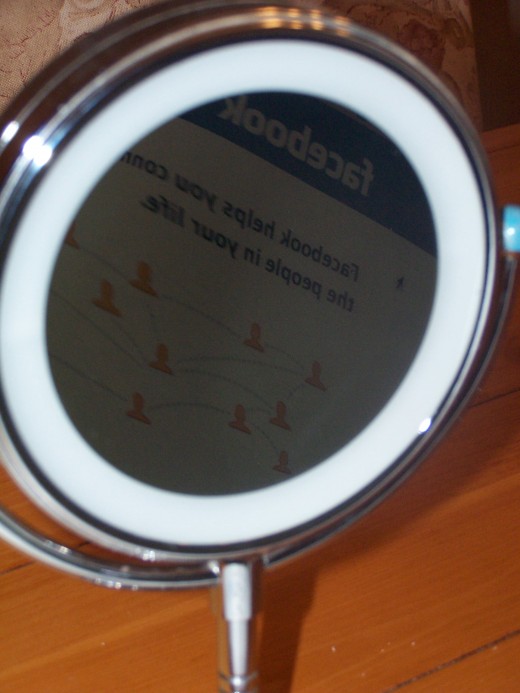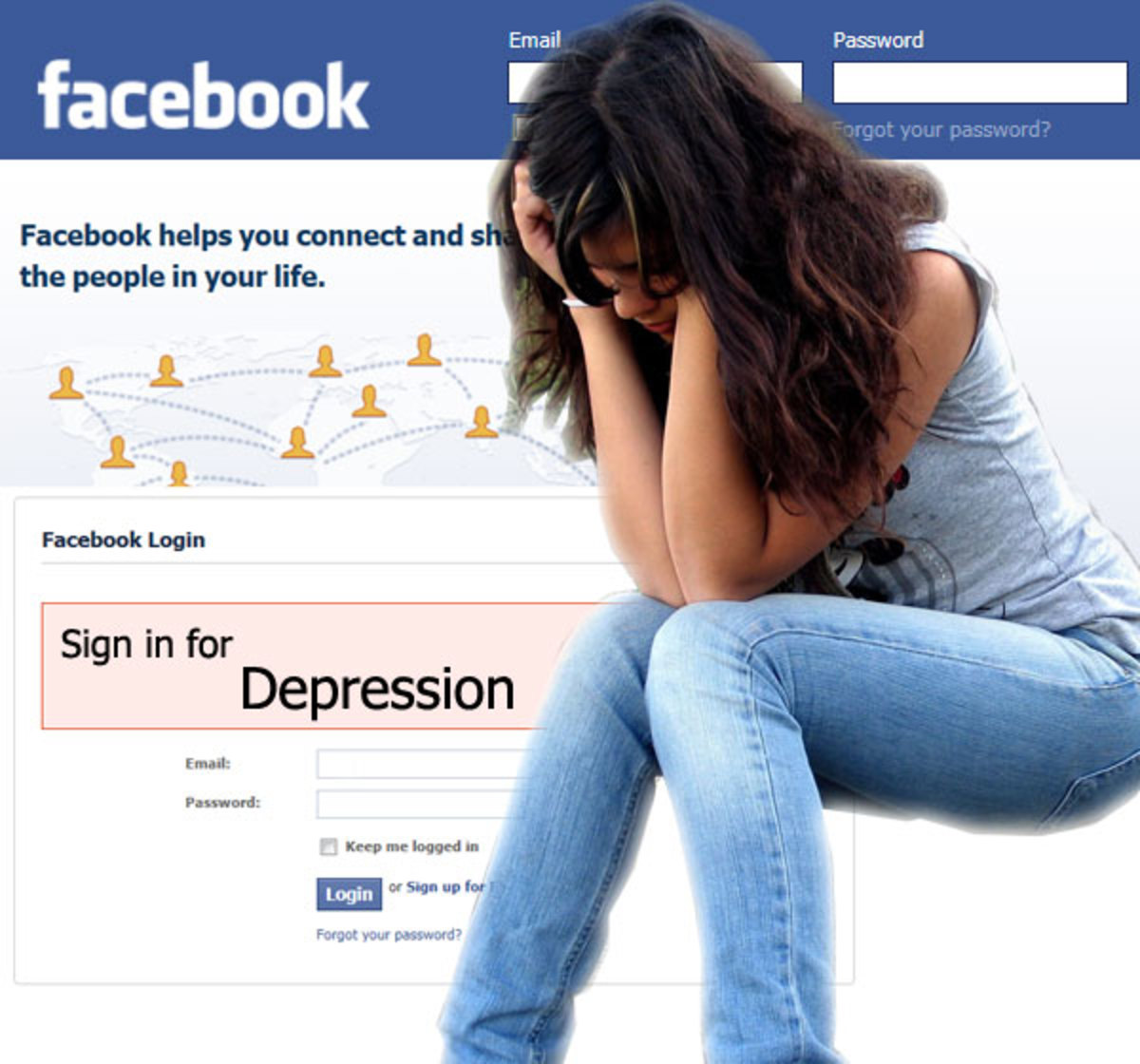Impact of Facebook on Self-esteem
Facebook can impact self-esteem, study finds.

The impact of mirrors and Facebook on self-esteem
A strange thing happened thirteen years ago when we moved into our new, first-ones-to-live-here, house. After having pushed the builder through seemingly endless delays, we finally were able to get a certificate of occupancy, close the sale, and move into our new home. The only catch was that it was not 100% complete. The final touches were to take place over the course of the following week and it was during that time that we found ourselves living without mirrors.
Unless you have lived without mirrors for any length of time, you probably take seeing your own reflection a few times a day for granted. Afterall, we come face-to-face with ourselves each day when we brush our teeth or hair; when we shave or apply makeup; or when we're just passing through a bathroom or bedroom.
But, unless you're one of the lucky ones with top-notch self-esteem, mirrors may do your psyche more harm than good. And interestingly, a 2011 study reveals that having a Facebook profile can have the opposite effect of mirrors and actually help in the process of building self-esteem.
Psychological benefits of having a Facebook profile: the mirror study
Sixty-three Cornell University students were recruited to participate in a study, which in essence compared two models of self-perception: Ojective Self-Awareness and Hyperpersonal Model. The research involved determining whether or not viewing one's Facebook profile impacted self-esteem.
The student participants were divided into three groups:
- Group 1 sat in front of computers with their Facebook profiles visible on the screen. They were allowed to edit their Facebook profile if they chose, but they could only view their own profile and accompanying tabs.
- Group 2 sat in front of computers that were turned off.
- Group 3 sat in front of computers that were turned off but that also had a mirror propped against the screen.
The non-Facebook groups (groups 2 & 3) took a quiz questioning their self-views as a measurement of self-esteem. After sitting there for three minutes and possibly editing their profiles, the Facebook group (group 1) was given an identical quiz.
The Facebook and Mirror experiment revealed that:
- Group 1 had a more positive self-view, and it was even more positive if the participant had edited their Facebook profile during the study.
- Group 2 showed no elevation in self-esteem
- Group 3 showed no elevation in self-esteem.
Overall, the take-away from this study, “Mirror, Mirror on my Facebook Wall: Effects of Exposure to Facebook on Self-Esteem,” was that, in fact Facebook can have a positive influence on the self-esteem of college students. At the very least, a short term boost in self-esteem is possible.
Mirrors may have a negative effect on self-esteem.

The mirror: self-reflection
Self-Reflection occurs when seeing one's reflection in a mirror, like group 3 did in the study, or in any other type of playback media, such as a video recording. One's limits and shortcomings are staring right back at him or her. Since a mirror represents reality, negative effects can occur if the reflection does not match one's ideal self. In other words, looking in a mirror can be a "downer."
Psychologists and sociologists call these feelings that are triggered when seeing oneself in a mirror objective self awareness. Objective self awareness is internal reflection occurring when the focus of attention is on one's self, thoughts, actions, and feelings.
Facebook profile: self-selection
Think of self-selection as the opposite of self-reflection. If self-reflection represents reality or an internal examination of self, then self-selection represents how people want other people to view them. This is called the Hyperpersonal Model and can also be thought of as self-presentation. So instead of one's self awareness being based on internal reflection, it becomes a reflection of the ideas about one's self that the person attributes to others.
Psychologists and sociologists call this phenomenon the Looking Glass Self. Simply put, the self-view an individual forms is created by imagining what others think of his or her appearance or behavior. This is the process that group 1 in the study was engaged in. Basically, Facebook users, and users of any social media, can filter out anything that reflects badly upon themselves.
How Facebook can build self-esteem
When understanding how self-reflection and self-selection impact one's self-esteem, it's not too hard to see how those two views come into play when interacting with social media. Think about it, if you have a Facebook profile, you don't wake up in the morning, snap a photo first thing, and upload it as a Facebook profile image for the world to see. The way people behave on Facebook and other social media is by using self-selection. In other words, you put your best foot forward.
Thefreedictionary.com defines the idiom, "putting your best foot forward," as:
To act in a way that causes other people to have a good opinion of you.
And isn't that how most people treat the presentation of themselves on social media? Don't most people put their best face forward? The most flattering self-selected photos are usually chosen in order to present a certain image -- the way the person would like others to perceive him or her. Perhaps happy group photos are selected to give the impression that one is a fun, free-spirit, always enjoying the company of friends. Or maybe a mother chooses a sweet image of herself with her children so that her friends will reflect upon her as a loving, always-there type of mom. No matter the case, self-selecting one's images can increase self-esteem.
So, if you are on the hunt for ways to boost your self-esteem, then consider creating a Facebook profile, if you don't already have one.
Facebook can build self-esteem through the:
- self-selection of photos and profile images
- self-selection of profile details
- overwhelmingly positive comments that are received and given
Positive and negative effects of Facebook

Psychological benefits of Facebook
The psychological benefits of Facebook are real. Perhaps this explains why so many teenagers are constantly engaged with Facebook. Without realizing it, teenagers may have discovered how to build self-esteem and feel good, at least in the short term.
While parents know that teenagers and self-esteem issues go hand-in-hand, parents should still set limits to the time their kids spend on social media. Other studies reveal that there are negative effects of Facebook on teenagers, especially when it is over used. "All things in moderation," is advice definitely worth heeding when it comes to limiting time that teenagers use Facebook and other forms of social media.
While the Facebook/Mirror study shows interesting results, it should just be taken at face value (no pun intended). It certainly is an eye-opener, revealing that self selective presentation can indeed influence one's self-esteem. But, further studies on the flipside should occur. For example, does Facebook cause self-doubt? What influence does Facebook have on self-esteem after viewing friends' profiles? Does Facebook incite feelings of envy? These are all valid questions, and since social media is here to stay, certainly worth studying.
Articles on Facebook and its Effects
- Cornell Chronicle: Study: Facebook walls boost self-esteem
Editing our own Facebook walls appears to boost self-esteem in college students, finds a new Cornell study by social media researchers. - Effects of Facebook on Teens: A New Study
The effects of facebook on teenagers, the subject of a new study by Dr. Larry Rosen, reveals negative effects of facebook on teens, as well as some positive effects. The overuse of social media, including facebook, can have a definite impact on teena







